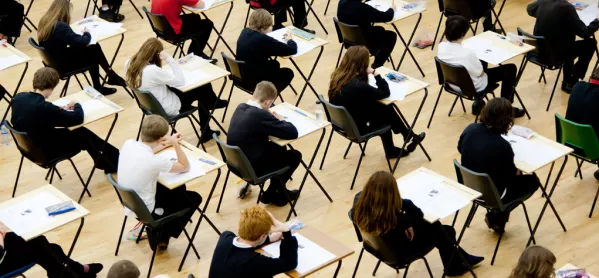- Home
- Surge in GCSE retakes sparks recruitment crisis
Surge in GCSE retakes sparks recruitment crisis

Almost nine in 10 colleges are struggling to recruit maths teachers, and more than two-thirds are finding it difficult to hire sufficient English teachers.
The scale of the recruitment crisis in the FE sector has been revealed in a survey carried out by the Association of Colleges (AoC) in partnership with TES. Significant numbers of colleges also reported issues attracting engineering, science and construction teachers.
Senior leaders in the sector have warned that the dramatic increase in the number of students retaking their English and maths GCSEs in colleges, after failing to achieve a C-grade during their time at school, was a major contributing factor.
‘A military operation’
The survey, which a third of college principals in England responded to, highlights the impact of the rising number of GCSE students in FE. Almost two-thirds (61 per cent) of principals said that they had been forced to take on additional short-term staff to meet demand, while one in five (21 per cent) said that they planned to hire external venues in order to provide adequate exam hall space.
Both subject areas have been under increased pressure since the government introduced a requirement for young people who don’t have a good GCSE pass to retake the qualification alongside their main programme of study.
Catherine Sezen, the AoC’s senior policy manager for 14-19 and curriculum, said that colleges had found it challenging to recruit the sheer number of additional English and maths teachers required.
“Of course, there will be difficulties to retain staff when we are in competition with the schools sector, which is also struggling to recruit,” she added. “Colleges don’t have halls in the same way schools do. They don’t have the infrastructure to hold exams on the scale [they] are being asked to. Logistically, it is a military operation.”
This month, Sussex Downs College failed to recruit an advanced practitioner in maths, despite offering a salary of more than £40,000. “We just couldn’t appoint,” principal Mike Hopkins said. “FE still offers an attractive package. But there must be reasons why we are struggling.” He added that ongoing restructuring and recent cuts to funding could make the sector appear a less secure option for potential teaching staff.
Geoff Hayward, professor of education at the University of Cambridge, said that his research for grant-awarding charity Gatsby had indicated that the ability of FE providers to help students to improve their maths GCSE grades was “highly constrained because of the supply of well-qualified mathematics teachers”. He added: “This is because, as a country, we produce too few mathematics graduates, and teaching as a career is unattractive to those graduates compared with alternatives such as banking, or indeed schoolteaching, because of the salary differentials.”
David Powell, director of the Education and Training Consortium of higher education and FE teacher training providers, led by the University of Huddersfield, said that he was not surprised by the survey results.
“The challenge comes about partly as a result of government policy around young people and resits,” he explained. “Because of that change in policy, the numbers have shifted.
“There is obviously competition between schools and colleges. And because of the differences in conditions of service, you don’t have a level playing field there.”
Upskilling the existing workforce, improving conditions of service for staff and offering effective CPD to aid retention could improve the situation for FE providers, he added.
‘New energy and ideas’
Helen Pettifor, director for professional standards and workforce development at the Education and Training Foundation (ETF), said that official workforce data continued to identify difficulties in recruiting suitable staff to teach maths and English.
She added that the ETF’s maths graduate recruitment scheme had attracted more than 280 people into the sector, bringing “new energy and ideas to teaching”.
A spokeswoman for the Department for Education said that requiring students with a grade C or lower in English or maths to retake the qualification gave them “another chance to succeed”.
“Last summer, 4,000 more students aged 17 and above secured GCSE A*-C grades in English, and over 7,500 more passed maths than the year before,” she said.
The government has invested £30 million over the past two years to “raise the quality of the further education workforce, with a focus on English and maths”, the spokeswoman added.
Maths problems will multiply
The introduction of a new, more difficult maths GCSE will result in more learners failing to obtain a “good” pass - and ending up retaking the qualification at FE providers, a University of Oxford academic has warned.
Speaking at the Westminster Education Forum event on maths qualifications held in London this week, Anne Watson, emeritus professor of mathematics education, said that this would add “another pressure on staffing numbers at FE”.
“In the short term, [the new GCSE grading system] will lead to fewer students achieving the target pass rate, and hence will make entry into many study routes, and professional training routes…impossible for more people,” Professor Watson added.
This is an article from the 27 May edition of TES. This week’s TES magazine is available in all good newsagents. To download the digital edition, Android users can click here and iOS users can click here
FE SPECIAL OFFER: click here to try out a TES Further Education subscription for just £1 for 4 weeks.
Want to keep up with the latest education news and opinion? Follow TES FE News on Twitter, like us on Facebook and follow us on LinkedIn
Keep reading for just £1 per month
You've reached your limit of free articles this month. Subscribe for £1 per month for three months and get:
- Unlimited access to all Tes magazine content
- Exclusive subscriber-only stories
- Award-winning email newsletters



